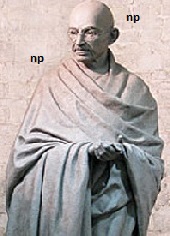| Connecting
over 25 millions NRIs worldwide |
|
|||||||||||||||||||||||
|
|||||||||||||||||||
Gandhi statue to be erected outside UK parliament on March 14 Gandhi Statue Memorial Trust has successfully raised £1 million
|
|||||||||||||||||||
1 |
|
250,000 pounds |
2 |
|
200,000 pounds |
3 |
|
200,000 pounds |
4 |
|
100,000 pounds |
5 |
|
100,000 pounds |
6 |
|
100,000 pounds |
“Gandhi is one of the most inspirational figures in history and the statute will be a fitting symbol to his teachings of non-violent, peaceful protests,” Sajid Javid, Culture secretary who chairs the Gandhi Statue Special Advisory Board said.
“It will mark the recognition by Britain that Gandhi was an honored part of our history too, as well as India’s; that he was a truly unique individual whose message is as relevant today as it was in his lifetime; and that the man who attracted so much hostility in the UK during the independence struggle, who fought the British and won, is now not just accepted but revered in the UK,” said Sir James Bevan KCMG, UK High Commissioner to India.
Sir James Bevan KCMG, UK High Commissioner to India, said: “I think Gandhiji himself would be pleased. Not for himself, for he was famously modest and self-deprecating, but for our two countries.” He was once asked during the struggle for Independence: ‘How far would you cut India off from the British Empire?’ He answered: ‘From the Empire entirely; from the British Nation, not at all. The Empire must go, but India should love to be an equal partner with Britain”. We are now forging that equal partnership and this statue is a symbol of it.
Priti Patel, Exchequer Secretary to the Treasury and UK Indian Diaspora Champion said:
The statue of Gandhi will be an incredible symbol of democracy and celebrate the life of a man of true greatness.
His story and work is one that the whole of humanity can learn from and be inspired by but it, of course, also has a special resonance with the Indian Diaspora community living in Britain today. The statue will be a lasting tribute to our strong ties with India.
Gandhi will be the first Indian, and the only person never to have been in public office, to be honoured with a statue in the square, BBC reported.
Lord Meghnad Desai, the founder-chair of the Gandhi Statue Memorial Trust, said: “It is great that there will be a monument honouring Gandhi in London’s Parliament Square, which was one of his favourite cities. He is the first Indian and the only person honoured with a statue in the Square, who never held public office.”
· Lord Meghnad Desai, UK based, Emeritus Professor of Economics, was awarded the Bharatiya Pravasi Puraskar by Indian Prime Minister Atal Bihari Vajpayee in 2004 and the Padma Bhushan by President Pratibha patil in 2008. He wrote the Rediscovery of India in 2009 and has written and spoken on Mahatma Gandhi extensively.
· Desai said:“I have often walked through Parliament Square looking at the statues of politicians and statesmen from around the world. Lincoln, Mandela, Lloyd George, Churchill and Smuts are all there. I often wondered, why not Gandhi?”
· Gandhi arrived in London before he was 19 and spent three years studying here. It is in London that he learned about his religion from theosophists and joined the Vegetarian Society becoming its Secretary. It is here that he matured, qualifying as ‘an English Barrister’ as he liked to call himself in India and South Africa while he practiced. Gandhi kept on coming back to London from South Africa to plead the case for justice for Indians settled in South Africa. He left South Africa to go to India in 1915 travelling via London. His final visit was for the Round Table Conference in 1931, the pictures of which inspired this statue.
The statue will stand alongside monuments to other statesmen including Nelson Mandela, Sir Winston Churchill and Abraham Lincoln in the square.
| |
|
|

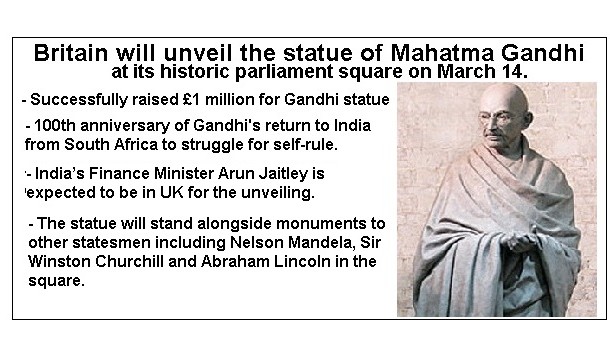
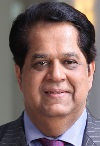 The Infosys board chaired by K.V. Kamath donated
The Infosys board chaired by K.V. Kamath donated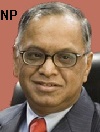 N R Narayana Murthy donated
N R Narayana Murthy donated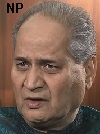 Rahul Bajaj Indian industrialists donated
Rahul Bajaj Indian industrialists donated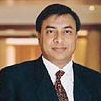 Lakshmi Mittal’s ‘Mittal donated
Lakshmi Mittal’s ‘Mittal donated UK-based NRI hotelier Vivek Chadha donated
UK-based NRI hotelier Vivek Chadha donated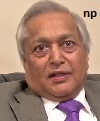 Rami Ranger
Rami Ranger